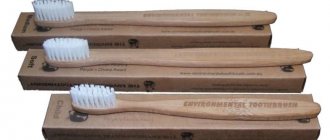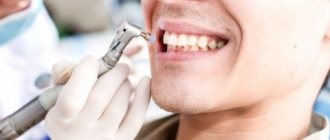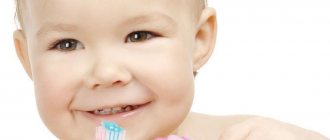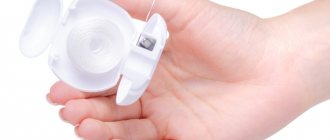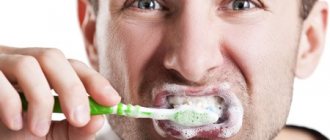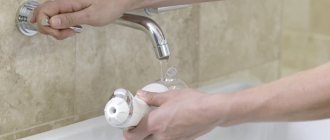Five basic rules
To properly and effectively brush your teeth, you must strictly adhere to the following:
- Comprehensive care - a toothbrush, no matter how carefully you use it, will not be able to reach all corners of the mouth, especially the space between the teeth, where plaque and harmful bacteria will constantly accumulate, which will eventually lead to the appearance of caries and other diseases. Therefore, also use dental floss and mouthwash.
- We update the arsenal - if dental floss and rinses do not require updating (the latter only deteriorate when their expiration date expires), then the brush must be changed every 3 months.
- Expensive, not always of high quality - you should not rely on the most expensive products; the dentist’s recommendations and your personal experience will be more important. Of course, sometimes you have to pay a high price for a good result, but not always (this is not the most important factor).
- Regularity and thoroughness - the procedures should be repeated twice a day (the cleaning process should last from 3 minutes): after the morning meal and before going to bed.
- Visit the dentist – we visit a specialist preferably 2 times a year.
Only comprehensive implementation of three basic rules will be an effective means of prevention. Otherwise, it will not give the desired results, and the resources spent will not protect against tooth loss.
Oral hygiene products
To effectively care for your teeth and mouth, you should use a number of products:
- brush;
- paste;
- a thread;
- rinse aid;
- Sometimes you can resort to chewing gum.
Toothbrushes
A toothbrush, although not perfect, is the main element of care; it accounts for about 90% of all teeth cleaning work. Therefore, its choice is one of the most important stages.
Criteria:
- toothbrush hardness - there are three types: medium, soft and hard. The latter are suitable for cleaning dentures, the medium ones are suitable for people with normal tooth sensitivity, and the soft ones are suitable for children and those with sensitive teeth or problem gums;
- electric or conventional - the cost of an electric brush is higher, but the cleaning effect is more noticeable. Do not forget that the attachments for them need to be changed once every 3 months. The power source for them can be either batteries or an accumulator.
Article on the topic: regular or electric toothbrush – what should you choose?
Dental floss
Floss is an integral part of comprehensive oral care, since it is the only remedy that can effectively clean the interdental space (there are also irrigators, but they are much more expensive).
Now there are a lot of dental floss on the market and you should choose them according to certain criteria:
- We recommend choosing flat threads with lubricant to avoid injury to the gums - lubricant not only reduces friction, but also has an antibacterial effect, which is very effective for the prevention of dental diseases;
- waxed or unwaxed – the former are better for beginners, they are more durable and easier to use;
- the threads can be fluoridated - this should provide the teeth with additional protection from diseases. But they must be used carefully and after consulting a dentist, since excessive amounts of fluoride can seriously harm your teeth;
- synthetic or silk - in most cases, flosses are made from synthetic materials, more expensive ones are made from silk. If you choose the first option, be sure to make sure that the composition does not contain allergens (information is available on the packaging).
Pastes
Recommendations:
- watch for the presence of fluoride - it is presented as a very useful element of toothpaste and this is true, but only in certain cases, for example, for the prevention of caries. If you already suffer from this disease or have fluorosis (an excess of fluoride in the body, as a result of which the teeth become covered with characteristic stains), then this remedy is contraindicated for you;
- the most expensive pastes do not guarantee the most positive effect - it depends on a combination of factors, including the body’s predisposition to a particular product or its components;
- Whitening pastes do not always bring the desired effect, and when choosing one, it is better to consult a dentist.
It is best to opt for a complex paste or a therapeutic and prophylactic one.
Rinse aids
Mouthwashes are the most complex of all the products listed above, since their effect extends not only to the teeth, but also to the entire oral cavity. Nuances of choice:
- preventive or therapeutic - the former provide comprehensive care for your mouth, while the latter act on a specific problem (for example, bleeding gums) and can only be used after a dental consultation;
- the composition of the rinse aid - make sure that it does not contain allergens. All the necessary information can be found on the packaging or ask a specialist about it;
- select a rinse in accordance with the toothpastes you already use - in this case, the effect of their use will be much higher.
Proper cleaning
Brushing your teeth can be considered the most important way to ensure oral health. Let's figure out how to do it correctly. Although dental health is important, let's not forget about the health of the gums and the surface of the tongue.
Here are a few rules that, if followed, can significantly improve the quality of oral cavity treatment:
- You need to position the brush at approximately a forty-five degree angle relative to the side.
- gentle rotational movements to clean the outside.
- Similarly, you need to thoroughly clean their insides.
- Using gentle circular movements, we treat the chewing surface of the teeth.
- It would be helpful to use a toothbrush to clean the surface on the edge of the tongue.
- The force of pressure on the brush when cleaning should not be too great to cause bleeding.
- What is important is what kind of bristles your toothbrush has that is most effective. Typically, softer or medium soft bristles are preferred. It is believed to be more effective in preventing the formation of plaque or tartar.
Step-by-step instructions for brushing your teeth
Brushing your teeth can be considered the most important means of ensuring oral health.
How to choose the right toothpaste that suits you best
Nowadays, the range of such products is very wide. Of course, in each specific case the answer will be different. In order to choose the best option for yourself, you need to proceed from your specific circumstances. It is best to choose the most effective type of toothpaste for yourself after consulting with a specialist.
How long can you use the same toothbrush?
This period should usually not exceed three months. If you have had a cold, it is better to change your toothbrush immediately, as germs may remain on it. You also need to look at the appearance of your toothbrush. If it has acquired a shabby appearance, then it is better to change it immediately.
Let’s also not forget that in our time there are effective methods of professional cleaning, which are carried out by specialists using special equipment. If you resort to them at least occasionally, it will provide important support to your health.
How to properly care for your teeth? Step-by-step instruction
To effectively care for your oral cavity, you should do it consistently and constantly. It is recommended to have a clear algorithm of actions:
- We brush our teeth equally thoroughly both from the outside and from the inside, the brush should move from bottom to top (from the gums to the end of the tooth). After this, you can clean the chewing surface of your teeth.
- You need to press on the brush, but you shouldn’t apply too much force - this can cause harm (especially in the case of sensitive teeth or gums).
- The next step is to clean your tongue, since this is where a large number of harmful bacteria accumulate. You can take care of your tongue with a regular toothbrush; as a rule, there is a special ribbed surface on the back of it. Use not too firm movements to move from the root to the tip of the tongue. Important! If possible, it is recommended to use special means (for example, a tongue scraper). You can also clean the inside of your cheeks in the same way.
- After these procedures, you need to thoroughly rinse your mouth with clean water and proceed to the next stage - cleaning the interdental space from plaque using dental floss: - take a floss (a 20-25 cm piece), wrap it around the index fingers of both hands; – begin to pull the floss between the teeth, gradually lowering it; – repeat the procedure for each tooth gap: first the front teeth, then slowly move towards the back teeth. Use a new section of floss for each new tooth joint, otherwise you may spread infection from the diseased area of your mouth to the healthy area.
- The last step is to use a mouthwash, a small amount of which (1 tablespoon) should be put into your mouth. Then thoroughly rinse each area of your mouth with it (about 2 minutes).
► These actions should be performed twice a day: in the morning (after breakfast) and in the evening (before bed).
At first glance, such a thorough cleaning of the oral cavity will require too much time, but after some time you will adapt and the procedure will take no more than 7-8 minutes.
Video: choosing pasta in the “Live Healthy” program with Elena Malysheva
Features of care for children
The first step is to debunk the myth that there is no need to care for a child’s baby teeth. The lack of preventive measures will lead to serious problems with permanent teeth, and visits to the dentist at such an early age do not promise anything pleasant for either the child or the parents.
Therefore, it is worth starting care from the moment the first teeth appear; this must be done carefully and gradually, but regularly.
- the first brush should be soft and have a small cleaning surface;
- it is very important to monitor its composition: look for a note on the packaging regarding the possibility of its use by children indicating the age;
- baby toothpaste must be as organic as possible, but it is necessary to monitor the presence of allergens in its composition;
- Pastes with a high fluoride content will be undesirable - they can lead to disruption of the development of both milk and permanent teeth;
- You should definitely consult a pediatrician and dentist - this will not only give you the opportunity to get recommendations on the choice of children's hygiene products, but will also accustom your child to regular medical examinations.
Good to know: how to brush your child’s teeth and at what age should you start doing this?
At the time of changing baby teeth, in addition to the oral care described above, it is necessary to monitor the quality of drinking water and food; if it contains too much fluoride, its dosage should be reduced, and vice versa.
After the final change of teeth, you can use the same products and in the same order to clean your mouth as for adults.
Where and how to store your toothbrush?
For most people, the answer to this question is obvious - in a glass on the bathroom shelf, of course! Firstly, there she is always in sight, and there is no need to waste precious minutes in the morning searching for her. Secondly, this is a matter of habit. Well, thirdly, this is the method of storing toothbrushes that is recommended by specialists - dentists. They insist that all the nuances be observed:
- The brush should stand with the bristles up. The fact is that after use it remains moist and creates a favorable environment for the development of bacteria and fungi. If you place it with the cleaning part inside the glass, the water will evaporate much more slowly, which means that microorganisms will multiply more actively and in larger quantities.
- The distance from the toilet to the shelf with accessories for brushing teeth should not be less than 3 meters. Particles of excrement and urine invisible to the eye travel this distance, scattering around during the draining of water and settling on various objects. By the way, closing the lid before pressing the button is a good habit, especially if you have to use a shared bathroom.
- When using one glass to store several brushes, you need to make sure that they do not touch each other. This is due to the possible transmission of infection - when one of the family members suffers from caries or herpes (not to mention more serious diseases), the rest of the household can become infected with the same viruses and microbes. However, this requires direct contact of the cleaning heads.
As for storage in a special case, it is justified only as a short-term measure - for example, while traveling. The reason for this restriction is the same harmful microorganisms that thrive in a confined space where heat and high humidity remain. If you constantly keep your brush in a plastic box, it will very quickly turn into a breeding ground for germs and can become hazardous to your health.
We recommend: How to make a wish for the New Year - 6 most popular ways

